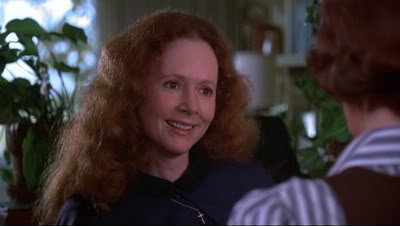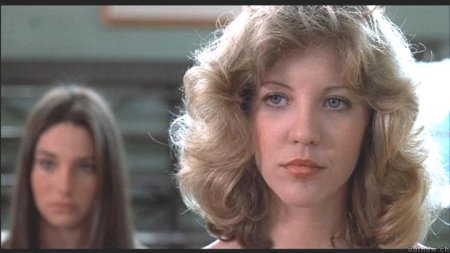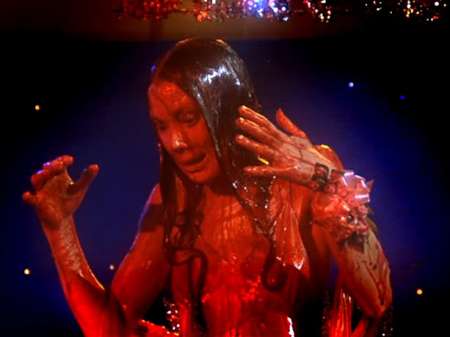Halloween Detour: Carrie
It’s closing in on Halloween, the season of the scary movie, and in honor of the holiday, here’s a review of Carrie, a science fiction horror film which stands tall in our cultural landscape. Without further ado, meet Carrie White!
Director: Brian De Palma
Cast: Sissy Spacek, Piper Laurie, John Travolta, Amy Irving, William Katt, Nancy Allen, P. J. Soles
Introduction Plot Summary Impressions Wrap-up
My rating: Class B (2/7, bright blue-white star). The classic tale of a damaged high school outsider and her vengeance upon her tormentors as only Stephen King could imagine it, and brought to the big screen by director Brian De Palma. Only the fact that the movie is somewhat dated at this point keeps it from being a Class O.
Carrie was, in 1974, Stephen King’s first published novel (though it was the fourth one he’d actually written). He received $2500 as an advance against royalties, and was paid $200,000 for the paperback rights, which sold one million copies in its first year. The book has been made into two films (the second a sequel), a television movie, and a Broadway musical. The movie did extremely well, grossing about $34 million dollars on a budget of less than $2 million. It helped to launch the movie careers of Sissy Spacek and John Travolta (this was his first big screen role).
In fact, Carrie is so much a phenomenon that you can’t hear the name without thinking of the film. References to the movie show up in some of the places you’d expect—Charmed, Buffy the Vampire Slayer, The X-Files—but they also show up in such diverse places as Spongebob Squarepants and Glee, as well as songs by the Ramones and P. J. Harvey.
The only major drawback to the film is that it was released in 1976. It seems slightly dated now, though it is a well-paced film with a big, if tragic, payoff. As I pondered the film and my reactions to it, however, I realized that it is more topical now than ever before—while the clothing, hair and certain other things were hopelessly mired in the seventies, in this day and age of cyberbullying and school shootings and teen suicides due to bullying, the movie is perhaps more relevant than at the time of its release.
There’s almost no point in a plot summary, as this story is extremely well-known. But I’ll give it a shot.
Carrie White is her high school’s outcast, raised by a mother with an obsessive religious focus. When she begins her first period at school in the shower, after P.E., she becomes hysterical because she doesn’t know why she’s bleeding and believes she’s dying. The girls all gather round, and in a scene chilling in its brutality, throw tampons at her while shouting “Plug it up! Plug it up!” Ms. Collins, the gym teacher, intervenes, and in the chaos a light bulb explodes.
As the movie progresses, Carrie reasons out that she has a power called telekinesis, while Sue Snell, one of the girls involved in the shower incident, has her boyfriend Tommy Ross ask Carrie to the prom so that Carrie can start to experience normal things and have a good time at one of the most important nights of her high school career. One of the other girls, Chris Hargensen, gets banned from the prom when she walks out of detention, and vows that Carrie will pay. She and her cronies kill a pig, put a bucket of its blood on a rafter, and rig the King and Queen of the prom election so that Carrie will be standing on stage, directly beneath the bucket. In the meantime, Carrie declares her independence from her mother and begins to reach for a normal life while her mother warns that everyone will laugh at her.
And so the stage is set for disaster, and disaster is precisely what ensues as Carrie, believing that everyone is laughing at her, uses her power to lash out at everyone around her.
Carrie is an extraordinary achievement in horror films, and most of the credit must go to Brian De Palma. He made some changes in the basic storyline. While the novel features a number of newspaper clippings, magazine articles and book excerpts surrounding the “Black Prom,” De Palma chose to tighten the focus on the individuals and emphasize the tragic and personal nature of the story. De Palma’s rigorous scene construction flows from foundation to frame to completed structure with a smooth and sure touch, and no scene is without purpose. He also used color to great effect, particularly in the prom scene leading up to the pig’s blood event, and the destruction of the school is a horrifyingly realistic picture.
Sissy Spacek, in the lead role as Carrie White, and Piper Laurie, as Carrie’s deranged mother Margaret, were both nominated for Oscars. Each deserves the recognition, as their performances were outstanding. Spacek’s performance is raw and human, and when Carrie hurts we hurt with her. But this shy, naive girl—with awakening psychic gifts and the attention from a caring teacher and a popular peer—develops the the strength to begin breaking away from her mother’s domination and to reach for a normal life. Her new-found and hard-won strength is a fragile thing, shattered when she believes that everyone is laughing at her. Her rage is predictable and understandable, and in a way we’re still rooting for her even when she begins to kill the innocent.
Laurie’s Margaret White, on the other hand, is something of an enigma. In the movie we don’t know why her father is gone, though Carrie tells her mother that he left for another woman. Mrs. White is a religious fanatic, and we don’t know the reasons behind that, either. She’s preoccupied with sin, and her oppression of Carrie is designed to keep Carrie from sinning. When she discovers Carrie’s power, she claims it comes from the devil, and after the events of the prom, she attempts to kill Carrie to thwart the devil’s will. Laurie brings a hard edge to Margaret White, and her steely eyed glares and fanatical determination are quite convincing.
There are a number of other performers worthy of note in this movie. Betty Buckly, who plays the teacher Miss Collins, is a perfect portrait of outrage and disgust at the antics of the girls in her charge—even though she understands their behavior, as she notes that Carrie somehow seems to invite those very antics. The remaining characters are, perhaps, more caricatures or sketches than they are fully realized people, but they nevertheless serve the film quite well. Nancy Allen (we’ve seen her as the female lead in Strange Invaders, and she later married Brian De Palma)’s Chris Hargensen is perfectly willful and spoiled, the popular girl who gets everything she wants. P. J. Soles potrays Norma as a bouncy, irrepressible girl who smiles nearly all the time. But she’s also Chris’ henchwoman and best friend, and her performance emphasizes that these girls are just doing what people do. Their evil is a very human kind of evil.
The movie has the pacing of a suspense story, rather than a slasher flick. The slow development of the plot is interesting because it’s so very human, and it employs a reverse Cinderella motif to grab the viewer’s attention. Carrie is the poor, ugly, awkward and unwanted girl who suddenly transforms into a princess, and though her ball has a very different ending, the fairy tale resonance is very real. The focus is always on Carrie, even when she’s not on the screen: she’s the fulcrum around which all the other characters move, in one way or another. And it’s Carrie’s emergence as a swan which transfixes the viewer.
Development for the other characters is weak, but in a way it doesn’t matter. The teenage villains of the story, Chris Hargensen and to a lesser extent her dupes Norma and Billy, are a sort of bland, thoughtless, self-centered evil. They’re teenagers, and they do what teenagers do because they want to do it. Their evil is banal, pedestrian and self-centered. Margaret White’s evil, on the other hand, is at least well-intentioned, though no less horrifying for all of that. Ranged against these darker forces are a genuine nobility of spirit in Sue Snell and Tommy Ross, who seek to atone for Sue’s actions and to do something positive for a fellow human being, and the maternal instincts of Ms. Collins. Of course, the darker forces win out in the end, as this is both a horror story and a tragedy.
The novel and film emphasize the strong female characters—Carrie, Mrs. White, Ms. Collins, Sue and Chris—because King had been challenged to write about women rather than the “macho” things he normally wrote about. But the movie is a fascinating glimpse at some very strong women, both good and bad, and the men are essentially relegated to the role of tools and weapons.
One of the things that struck me was the way blood kept turning up in the movie. Carrie’s menstrual blood, a terrifying event for her as her first period strikes in a complete lack of knowledge of basic biology, opens the movie. Mrs. White, in a strange and unusual turn of phrase, spreads the “gospel of salvation through Christ’s blood,” and refers to Carrie’s first period as the “curse of blood.” And then, of course, there’s the pig’s blood at the prom.
You can’t really view this film as a revenge flick, unless the message is that revenge never works. Carrie takes out her revenge on all the wrong people—killing Tommy, Ms. Collins, and the teenagers who had begun to treat her kindly—in an orgy of perhaps uncontrolled destruction. She only kills her true tormenters, Chris and her mother, in self-defense. And Chris’ malicious actions are a sort of misguided revenge in and of themselves. That’s part of the tragedy of the film, of course.
Carrie’s telekinetic gifts are presented in the context of science rather than magic. However, most scientists regard telekinesis as pseudoscience, a sort of impossibility wrapped in a thin veneer of scientific plausibility (quantum mechanics being the most recent science to serve as an underpinning for parapsychology). And certainly, there is no objective scientific evidence of genuinely reproducible psychic phenomena. Telekinesis, telepathy, and all the other psychic powers mankind has dreamed up would violate the laws of physics as we know them. Yet Carl Sagan was unwilling to denounce them as impossible, instead suggesting that proof would require iron-clad evidence. And two major American universities—Duke University in North Carolina and the University of Arizona—have parapsychology research centers. The Soviets worked hard at developing psychic powers for their military, and rumors have abounded for years that the American military establishment also had a research program.
Personally, I’m of the opinion that such powers are fantasy, pure and simple wish fulfillment. If humanity had gifts of this nature, we’d be using them reliably by now—we understand a great deal of our capabilities and are nearly always ready to exploit them. But a substantial fraction of Americans do believe in psychic powers, and since the jury really is still out, let’s just say that the science in this movie is implausible but fun.
Though a mite dated now, Carrie is still a classic film, and the reverse Cinderella arc set in the midst of high school cruelty has lost none of its emotional punch. Most of us can remember people in high school who were bullied and looked down upon by the rest of the school—I know that my high school, which I always viewed as an unusually nice kind of place for a high school, had its share of social outcasts. Carrie takes the normal aspects of high school and simply ramps up the cruelty a bit.
Or does it? Every week, it seems, we hear of a new case of bullying in our high schools. Consider the case of Tyler Long, a young man with Asperger’s syndrome who was bullied at school, hung himself at seventeen, and then his tormenters wore nooses at school, without reprisal from the school itself. Or poor Phoebe Prince, an Irish girl who had the good fortune to date a football player shortly after arriving at a new school, at least until the “in” crowd closed ranks and began to torment her. She, too, hanged herself, though in her case, the seventeen-year old bullies were prosecuted and entered guilty pleas. In a biyearly survey last conducted this year with over 40,000 students, half of the students admitted to bullying others, and half also said they had been bullied.
Carrie taps into our fear of ostracism and social rejection, and while Carrie’s actions are tragically wrong, we feel for her and understand her pain and her anger. Some would say that the teenagers’ behavior, which mirrors the kinds of things adults do to one another in more subtle ways, is the horrifying aspect of the movie. And for that reason alone, the movie is worth watching. It has genuinely creepy moments, along with some spine-tingling aspects. Do yourself a favor this Halloween season, and spend some time with Carrie.
Related articles
- Oscar Horrors: Carrie White Burns In Hell (thefilmexperience.net)
- You’d think they’ve have put this one on Netflix Instant Streaming for Halloween… (eoghann.com)
- Carrie – 1976 (jdcwitherton.com)









November 30, 2011 at 7:46 am
I liked the film and everyone in it, but I got to tell you that I found the mother more unbelievable than main character’s special talent. In the end the mother was the monster, wasn’t she? SK always makes a statement about dysfunctional relationships.
November 30, 2011 at 9:22 pm
In a lot of ways, movie Margaret is a plot device; I half-remember that novel Margaret made a lot more sense, and that the relationship between Carrie’s father and Margaret had something to do with how crazy she wound up. I think novel Margaret knew about Carrie’s power because her father had it too. Which goes some way towards explaining why novel Margaret was so crazy.
King’s characters, to me, are often flat, caricatures as opposed to full personalities—unless it’s one of the novels he’s really interested in, in which case they tend to be beautifully drawn personalities with real verisimilitude.
Stick around, by the way: I watched the 2002 made-for-television remake, and am currently formulating a review of it…
September 23, 2012 at 4:27 pm
I support Carrie because I sympathize with her due to being bullied by one of my parents and my former classmates. But what makes you think that other people root for Margaret. And since when is she well-intentioned? She claimed to be well-meaning but she never was.
Plus, I’d never root for her due to her fanatical and abusive behavior. Why, she reminds me of my dad, who was also abusive and overly domineering to me. Therefore, she makes me please that Carrie killed and her other torturers like that pathetic Chris.